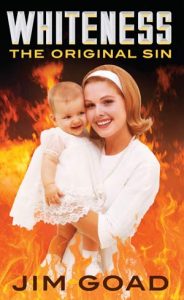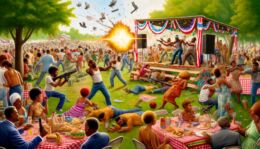Juneteenth: It’s All So Junetiresome
Imagine existing as a distinct racial group on a continent for 400 years. Now imagine that your group’s greatest collective “achievement” is being freed from slavery — not rebelling against your slaveowners and freeing yourselves, but walking into freedom atop a red carpet of 600,000 or so bloody cracker corpses that reputedly died in the service of either freeing you or keeping you enslaved.
You are imagining Juneteenth, a sloppy portmanteau of “June” and “nineteenth,” a federal holiday based around the fiction that America’s last enslaved blacks were freed on June 19, 1865 in Galveston, Texas. On that fateful day, Union General Gordon Granger ordered the enforcement of the by-then-dead Abraham Lincoln’s Emancipation Proclamation — which was proclaimed on January 1, 1863, but news traveled slowly those days — so that a quarter-million or so sweaty and nappy slaves yearning for freedom in the Texas heat were now free to become happy and productive American citizens just like the rest of us.
Audio version: To listen in a player, use the one below or click here. To download the mp3, right-click here and choose “save link/target as.”
These weren’t the last black slaves to be freed in America, though. Black slaves were still pickin’ cotton and singin’ “Michael, Row the Boat Ashore” in Kentucky and Delaware for another six months, until December 1865. Choctaw and Chickasaw Indians still held black slaves in what is now the state of Oklahoma all the way until the summer of 1866, but I’ve never heard of a single black person who celebrates “Chickteenth.”
If you really think that freeing all the black slaves was an idea worth celebrating and you sincerely wanted to pick a sensible date, it should be December 6, 1865 — the day on which the 13th Amendment abolished slavery throughout the United States. That was the date on which black Americans were finally free to twerk. Free to rape. Free to misspell. Free to murder. Free to riot. Free to whine.
Celebrating Juneteenth has been a black American folk custom ever since they stopped being three-fifths of a person and became five-thirds of the country’s problems.
The idea of Juneteenth as a state-sanctioned holiday first took root in Texas, where it was officially known as “Emancipation Day.” In 1938, back when it was still acceptable to refer to darkies as “Negroes,” Texas Governor James Allred proclaimed:
Whereas, the Negroes in the State of Texas observe June 19 as the official day for the celebration of Emancipation from slavery. . . .
Whereas, since that time, Texas Negroes have observed this day with suitable holiday ceremony. . . .
NOW, THEREFORE, I, JAMES V. ALLRED, Governor of the State of Texas, do set aside and proclaim the day . . . for observance of EMANCIPATION DAY . . . in Texas, and do urge all members of the Negro race in Texas to observe the day in a manner appropriate to its importance to them.
By the end of the twentieth century, three more states — Florida, Oklahoma, and for some reason, Minnesota — recognized June 19 as either an official holiday or a day of observance. Over the next 20 years, every other state except for South Dakota — bless its soul — also commemorated or observed Juneteenth.
While running for reelection in 2020, Donald Trump proposed making Juneteenth a national holiday as part of his ill-advised “Platinum Plan” to appease the rioting Mau Maus who’d gone verklempt that summer over the hilariously tragic loss of George Floyd.
On June 17, 2021, cadaverous Chief Executive Joe Biden signed the Juneteenth National Independence Day Act into law, making it the first federal holiday since Martin Luther King, Jr. Day became another paid day off for shiftless federal workers way back in 1986. So the last two federal holidays were meant to appease blacks and act as Anti-Riot Insurance.
In his comments at the White House signing, Biden managed to spit up these words from of his dry, blistered, pruny mouth:
Juneteenth marks both the long, hard night of slavery and subjugation, and a promise of a brighter morning to come. This is a day of profound — in my view — profound weight and profound power.
A day in which we remember the moral stain, the terrible toll that slavery took on the country and continues to take — what I’ve long called “America’s original sin.”

You can buy Jim Goad’s Whiteness: The Original Sin here.
It’s also clearly a sin that will never be forgiven.
In 2021, black Americans commemorated the first federally-recognized Juneteenth by shooting one another at Juneteenth get-togethers in North Carolina, South Carolina, Louisiana, Pennsylvania, and Indiana. But the capstone of that year’s celebrations was when an Oakland Twerk Mob prevented an emergency medical technicians’ truck from providing help to seven people who’d been injured by gunfire.
Last year’s Juneteenth was one for the record books. It saw 103 shootings, including 19 mass shootings, from coast to coast and left 13 aspirant string theorists dead in Chicago alone.
But unless we’re lurching toward a trend of severely underreporting violent crime — which is always a possibility — this Juneteenth appeared to be much less violent than last year’s.
Try as I may, I couldn’t find much besides a non-life-threatening shooting near a Juneteenth hootenanny in Norfolk and a celebratory mass shooting during a Juneteenth music festival last weekend in Round Rock, Texas that took the lives of two black women and injured 14 others, including children.
According to Round Rock Police Chief Alan Banks — who, like apparently all American police chiefs these days, is black:
At approximately 10:50 PM, an altercation broke out between two groups. During that altercation, someone produced a gun and began to fire. Multiple victims were hit. . . .
They were actually folks that were there enjoying the concert. Old Saddler Park is an open field with a stage. It occurred near the vendor area away from the stage.
The two victims, I can tell you, were not part of the altercation.
So having an event like this, where we’re here to celebrate, and celebrate such an occasion as Juneteenth, and to come together as a community is a terrific monumental event for us. . . . It breaks your heart for a family that was coming out to enjoy their evening and now their life is forever changed as a result of somebody who could care less about somebody else’s life. And that’s so disappointing.
What’s most disappointing to me — even more than the lost lives and wanton bloodshed — is that Chief Banks doesn’t know that the proper term is “couldn’t care less.” If you could care less, that implies that you care a little.
Banks described the shooter as:
- Black male
- 5 feet, 7 inches tall
- Thin build
- 19-20 years old
- Hair in short dreads
- Last seen wearing a white hoodie
Texas Governor Greg Abbott is offering a $20,000 reward for information leading to the shooter’s arrest. Although it’s likely that many “innocent” witnesses could identify him, at the moment it appears that the surviving blacks are more in thrall to the ’hood’s “no snitches” rule than they are to snapping up that tantalizing $20K being dangled before their paws.
Then, five minutes after handing in my original draft to this article, I learned that at least one person was killed and others were shot and stabbed as Juneteenth festivities in Oakland somehow, out of nowhere and against all expectations, turned violent.
The other night the missus and I watched the 1965 Western comedy Cat Ballou, which I hadn’t seen since I was four years old. Throughout the movie, the plot is pushed along by two singing minstrels: a short, fat paleface whose screen name was Stubby Kaye (real name Bernard Shalom Kotzin) and Nat King Cole, the famous crooner who died shortly after filming. Nat King Cole — now there was a nice black man. Knew his place, didn’t act uppity, and smiled on cue. Jack Benny’s sidekick Eddie “Rochester” Anderson was another nice black man from back in the days when they smiled and tipped their hats and said “Yessir.” They were better when we called them “Negroes” and “coloreds.” They were much more tolerable when they knew their place and minded their manners. I liked them a lot more when they were obedient and frightened.
But with all of their unearned pride, modern black Americans are the skid marks on the clean white adult diapers of the body politic. They’re really Junetesting my patience.





